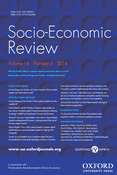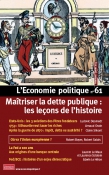Socio-Economic Review, Discussion Forum: « Brexit: understanding the socio-economic origins and consequences » , 2016, Vol. 14, n° 4, p. 836-845.
Abstract
Jacqueline O’Reilly, Julie Froud, Sukhdev Johal, Karel Williams, Chris Warhurst, Glenn Morgan, Christopher Grey, Geoffrey Wood, Mike Wright, Robert Boyer, Sabine Frerichs, Suvi Sankari, Akos Rona-Tas and Patrick Le Galès
The unprecedented geopolitical shift resulting from Brexit reflects deep socio-economic fault lines within and beyond the UK. In many ways foreshadowing the US presidential election of Donald Trump, Brexit brought to the surface and gave a public voice to socio-economic divisions that were deeply embedded, sometimes illogical, but until now had either been ignored or hushed out of ‘respectable’ public debate. This Discussion Forum emanates from a spontaneous seminar organized 2 days after the Brexit vote on June 25, 2016 as part of the SASE conference held in University of California–Berkeley and followed by an open call for papers by Socio-Economic Review. The papers here draw attention to the origins of the Brexit vote in deep-seated socio-economic divisions (O’Reilly), widening differences in economic performance across sectors and regions of the UK (Froud, Sukhdev and Williams) and the growth of poor quality jobs (Warhurst). Meanwhile, the political dynamics of the Brexit vote were also shaped by the fractured nature of UK business elites (Morgan), divisions between locals and cosmopolitans (Grey) and creative but muddled actions of elites that arguably generated consequences they themselves failed to fully anticipate (Wood and Wright). From the perspective of Europe, Brexit reflects a history of dysfunctional economic policy in Europe that prioritized market competition in ways that neglected and ultimately undermined solidarity (Boyer). Here, Brexit reflects a political strategy to both renationalize and recommodify solidarity in the face of fears over migration, and which are likely to have major consequences for social solidarity in Europe more generally (Frerichs and Sankari). However, Brexit is unlikely to provide a durable social and political solution to the wider tensions between globalization and democracy, which also affect all countries throughout Europe (Rona-Tas). Ultimately, the Brexit vote underlines social divisions that combine class inequalities with regional ones, not just in Britain but throughout Europe (Le Galès).
Paper prepared for the « Forum de la régulation« ,
La théorie de la régulation à l’épreuve des crises, Paris 10-12 juin 2015
Le Monde, 4 septembre 2015, p. 6. (version complète)
AmiensBoyer3-5dec2014V1Présentation au Colloque « Crise de l’euro, effets discursifs et changements institutionnels : approches transdisciplinaires », CRIISEA, UFREG/Université de Picardie Jules Verne, 3-5 décembre 2014.
Chapitre 1 in Structural Change, Competitiveness and Industrial Policy: Painful , Lessons from the European Periphery [Format Kindle], Sous la direction de Aurora A. C. Teixeira, Ester Silva and Ricardo Mamede, Routledge, 2014
Whathavewelearnt7 Contribution to the project “Crises, changes and continuity”
Seminar at International Institute of Social Studies, The Hague, Netherland, 20th February 2014




